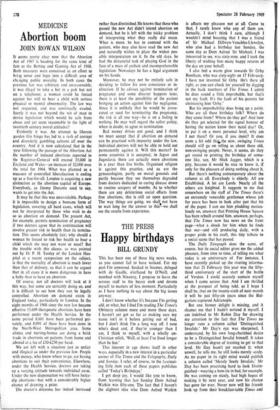Abortion boom
MEDICINE JOHN ROWAN WILSON
It seems pretty clear now that the Abortion Act of 1967 is heading for the same kind of fate as the Betting and Gaming Act of 1960. Both measures were conceived as an effort to brim sense and logic into a difficult area of changing public morality. In both cases the previous law was arbitrary and unreasonable; it was illegal to take a bet in a pub but not on a telephone; a woman could be forced against her will to bear a child with serious physical or mental abnormality. The law was not respected, and was continually evaded. Surely it was not beyond the wit of mail to devise legislation which would be safe from abuse and yet seem reasonable in the light of twentieth century moral attitudes?
Evidently it was. An attempt to liberate garden fête bingo has led to a rash of corrupt and disorderly gambling saloons all over the country. And it is now calculated that in the yeir following the passage of the Abortion Act the number of induced abortions reported to
the Registrar-General will exceed 35,000 in Eailand and Wales—an increase of 32,000 over the total for 1964. What was planned as a
measure of controlled liberalisation is ending up as a free-for-all. London is acquiring a new distinction as the abortion capital of Europe. Everybody, as Jimmy Durante used to say, wants to get into the Act.
It may be that this was unavoidable. Perhaps it is impossible to design a humane form of legislation, covering all hard cases, which will not be interpreted by those who wish to do so as abortion on demand. The present Act, for example, permits termination of pregnancy if two doctors agree that its continuation will involve greater risk to health than its termina- tion. This seems absolutely fair; why should a woman be forced to risk her health to bear a child which she may not want or need? But the trouble with this clause, as was pointed out by Dr P. H. Tooley of the London Hos- pital at a recent symposium on the subject,
is that the mortality of abortion is much lower than that of delivery, so that it can be argued that in all cases it is more dangerous to have a baby than to have an abortion.
Of course, not all doctors will look at it this way, but some are certainly doing so, and
it is difficult to see how they can be legally controlled. Abortion on demand exists in England today, particularly in London. In the eight months of 1968 since the new law became
effective 13,609 therapeutic abortions have been performed under the Health Service. In the same period 8,601 have been performed pri-
vately, and 8,091 of these have been done in the North-West Metropolitan area. Some clinics and nursing-homes are doing a brisk trade in abortions on patients from home and abroad at a fee of f50-£250 per head.
We are left with a situation just as unfair and illogical as under the previous law. People with money, who know where to go, are having abortions to suit their convenience. Elsewhere, under the Health Service, doctors are taking up a varying attitude towards individual cases. Under the new dispensation we still have lucky- dip abortions—but with a considerably higher chance of drawing a prize.
The doctor's dilemma has indeed increased rather than diminished. He knows that those who passed the new Act didn't intend abortion on demand, but he is left with the tricky problem of interpreting what they really did mean. What is more, he has to contend with the patient, who may also have read the new Act and naturally wishes to place the widest pos- sible interpretation on it. In the old days, he had the distasteful task of playing God in the face of a mass of archaic and incomprehensible legislation. Nowadays he has a legal argument on his hands.
Moreover, he may not be entirely safe in deciding to follow his own conscience or in- clination. If he advises against termination of pregnancy and some disaster happens later, there is at least the possibility of the patient bringing an action against him for negligence. Since it is unlikely that he would be prose- cuted or sued for terminating the pregnancy, the risk is all one way—he is on a hiding to nothing. He may well regard the safest policy, when in doubt, to agree to termination.
Bad money drives out good, and I think we must accept that if abortion on demand can be practised with impunity under the law, individual doctors will not be able to bold out permanently against it. Will this matter? In some countries it is accepted; in Japan and Jugoslavia there are actually more abortions in a year than live births. Organised religion is against this practice, and so are the gynaecologists, partly on moral grounds and partly because they see themselves degraded from doctors dedicated to curing disease down to routine scrapers of wombs. As to whether there are any deleterious social effects from free abortions, this is still an open question. The way things are going, we shall not have to wait long for the answer to this—, we shall see the results from experience.


































 Previous page
Previous page